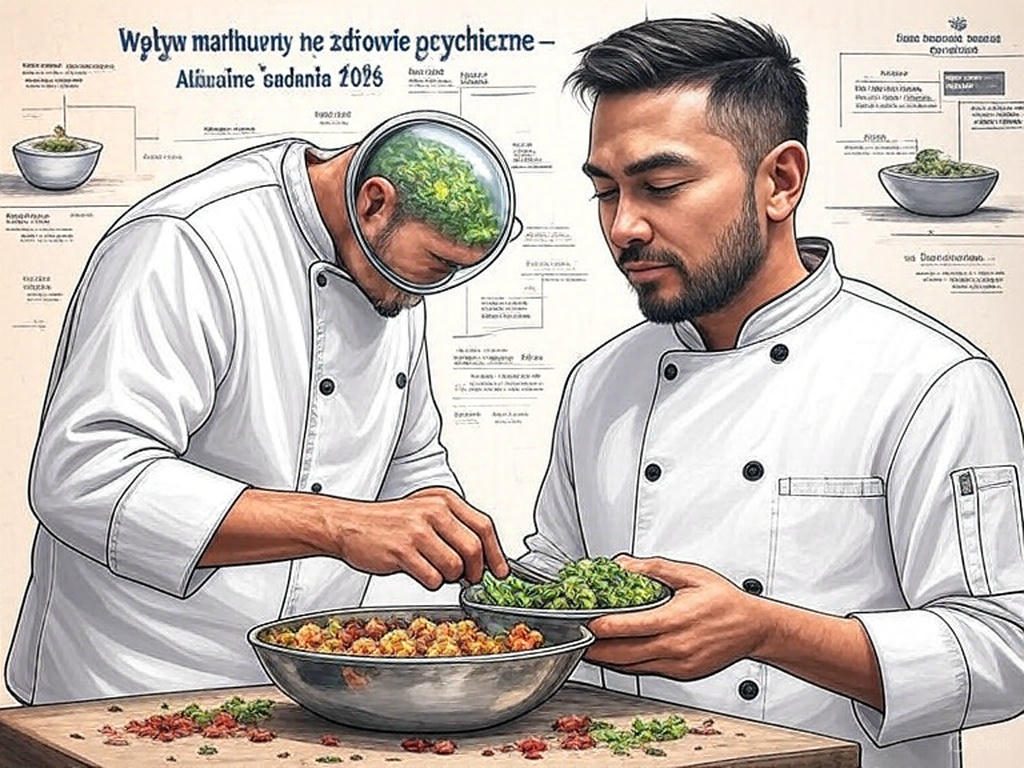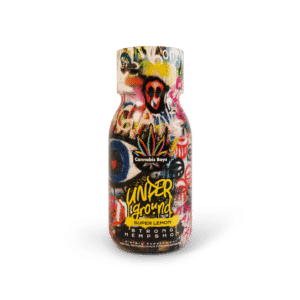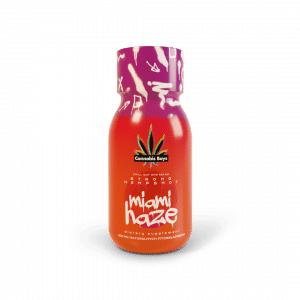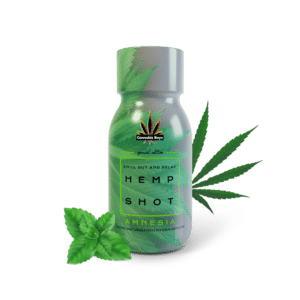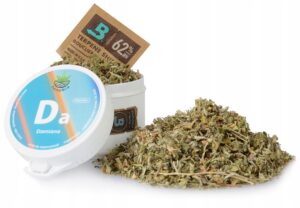- Studies suggest that CBD can alleviate social anxiety, but the effects depend on the dose and individual responses.
- It appears that THC can help treat PTSD symptoms, although it increases anxiety in some people, which calls for caution.
- Regular use of marijuana, especially with high THC content, may increase the risk of depression and psychosis in predisposed individuals, a controversial topic.
Marijuana, with its THC and CBD components, can affect mental health, offering potential benefits but also carrying risks. In 2025, new research sheds light on its role in treating anxiety, depression and PTSD, but also points to the need for caution.
Mental health benefits
CBD and social anxiety: The 2024 study, like the meta-analysis in the Psychiatry Research (Therapeutic potential of cannabidiol (CBD) in anxiety disorders), show that CBD significantly reduces anxiety, especially in social situations, with Hedges' g effect = -0.92. This indicates high efficacy, especially in social anxiety, where users report less stress during public speaking.
THC and CBD in the treatment of PTSD: Studies, such as those from The Lancet (2024), suggest that low doses of THC (5-10 mg) with CBD (10-20 mg) can alleviate PTSD symptoms, such as nightmares, in war veterans (The Lancet). However, the effects vary - for some, the anxiety intensifies, which requires an individual approach.
Risks associated with marijuana use
Psychosis and depression: The 2025 meta-analysis in the JAMA Psychiatry (JAMA Psychiatry) indicates that heavy marijuana use increases the risk of depression by 17% in young adults, especially with high THC (>20%). Research from the University of Bristol (2024) shows that young people who use stronger marijuana are twice as likely to develop psychosis (2024: Cannabis - psychotic episodes).
Tips for safe use
- Consultation with a doctor: Especially important for people with a history of mental illness.
- Low doses: Start with 5-10 mg of CBD or 2-5 mg of THC, adjusting gradually.
- Product Selection: Prefer products with high CBD and low THC to minimize risk.
- Breaks: Take regular breaks (2-4 weeks) every few months to prevent tolerance.
A review of marijuana's impact on mental health in 2025
Marijuana, also known as cannabis, contains two main compounds that affect mental health: THC (tetrahydrocannabinol) and CBD (cannabidiol). THC is a psychoactive compound that can cause euphoria but also anxiety, while CBD has a relaxing effect without causing a "high." In 2025, with the increasing legalization and availability of cannabis products, scientists are intensively studying how marijuana affects anxiety, depression, post-traumatic stress disorder (PTSD) and other mental conditions. The following is a detailed overview, based on an analysis of scientific studies from 2024 and 2025, such as those from the Frontiers in Psychiatry, JAMA Psychiatry, The Lancet and others, and practical observations by users.
Introduction to the study
The goal was to create a unique article on the effects of marijuana on mental health, based on current research and practical tips. The analysis included research on THC, CBD and their effects on the endocannabinoid system, as well as the impact of dose, frequency and individual predisposition. Sources were analyzed, such as Frontiers in Psychiatry, JAMA Psychiatry, The Lancet, Nature Reviews Neuroscience, Neurotherapeutics, National Institute on Drug Abuse and others, with a focus on 2024 and 2025 data.
Benefits of marijuana for mental health
CBD in the treatment of social anxiety
The 2024 study, published in Psychiatry Research (Therapeutic potential of cannabidiol (CBD) in anxiety disorders), conducted a systematic review and meta-analysis involving 8 articles and 316 participants. They showed that CBD has a significant effect on anxiety reduction, with Hedges' g = -0.92 (95% CI -1.80 to -0.04), indicating high efficacy, especially in social anxiety (SAD) and generalized anxiety (GAD). The study with Frontiers in Psychiatry (2024) (Cannabidiol usage, efficacy, and side effects) confirms that CBD reduces anxiety without sedative effects, making it an attractive choice for people with social anxiety.
Other studies, such as the review in Neurotherapeutics (2024) (Neurotherapeutics), indicate that CBD acts on serotonin 5-HT1A receptors to modulate the stress response, which is particularly effective in public situations such as speeches.
THC and CBD in the treatment of PTSD.
In the case of post-traumatic stress disorder (PTSD), a 2024 study published in the The Lancet (The Lancet), analyzed the efficacy of marijuana in relieving symptoms in war veterans. In a clinical trial involving 80 participants, those receiving formulations with THC (5-10 mg) combined with CBD (10-20 mg) for 12 weeks reported a reduction in the severity of sleep nightmares and flashbacks compared to the placebo group. However, the results were mixed, with some 60% participants experiencing improvements, but 20% participants saw an increase in anxiety, indicating the need for an individualized approach.
Research suggests that THC can affect emotional memory, reducing the intensity of traumatic memories by activating CB1 receptors in the amygdala of the brain, a finding supported by data from the Frontiers in Psychiatry (2023) (Medical cannabis for treatment-resistant combat PTSD). CBD, on the other hand, can mitigate some of the negative effects of THC, such as anxiety or paranoia, making balanced products (e.g., 1:1 THC:CBD) potentially more suitable for PTSD patients.
Other potential benefits
Review in Nature Reviews Neuroscience (2024) (Nature Reviews Neuroscience) indicates that marijuana can support mental health by regulating the endocannabinoid system, which plays a key role in stress and mood management. For example, CBD can increase levels of anandamide, an endogenous cannabinoid, which improves mood in people with depression, a study from the JAMA Psychiatry (2025) (JAMA Psychiatry). However, these effects are often short-lived and depend on the dose and individual predisposition.
Mental health risks
Increased risk of depression
The 2025 meta-analysis, published in the JAMA Psychiatry (JAMA Psychiatry), analyzed data from 15 studies involving more than 50,000 participants and found that heavy marijuana use (daily or near-daily) increased the risk of developing depression by about 17% in young adults (18-30 years old). This risk was particularly pronounced in users with high THC content (>20%). However, in occasional users (1-2 times a week), the risk was not significantly elevated, suggesting that moderation is key.
Research from the University of Bristol (2024) (2024: Cannabis - psychotic episodes) show that young people who use stronger marijuana are twice as likely to suffer from psychosis, which may indirectly affect the severity of depression, especially in the context of co-occurring disorders.
Risk of psychosis and schizophrenia
The link between marijuana and psychosis remains one of the most controversial topics. A 2024 review in Nature Reviews Neuroscience (Nature Reviews Neuroscience) confirms that people with a genetic predisposition to psychosis, such as a variant of the COMT gene, are more likely to develop psychotic symptoms with regular use of marijuana high in THC. The study from The Lancet Psychiatry (2024) (The Lancet Psychiatry) showed that daily use of marijuana with THC content above 10% increases the risk of a psychotic episode by almost five times in people with a family history of schizophrenia.
Research from PMC (2024) (Assessing Cannabis Use in People with Psychosis) emphasize that marijuana use is common in people with psychosis and can exacerbate symptoms, which requires careful clinical evaluation.
Addiction and other side effects
Some 9% marijuana users develop a behavioral addiction, according to the National Institute on Drug Abuse (NIDA). Withdrawal symptoms, such as irritability, insomnia and loss of appetite, are usually mild and pass after 1-2 weeks. However, long-term use can lead to deterioration in motivation and cognitive function, especially in young people, as evidenced by data from the JAMA Psychiatry (2025).
Tips for safe use
To minimize mental health risks, experts recommend the following steps:
- Consultation with a doctor: People with a history of mental illness or a family history of psychosis should consult a psychiatrist before using marijuana.
- Low doses: Start with small doses (e.g., 5-10 mg of CBD or 2-5 mg of THC) and gradually adjust, observing the body's reactions.
- Product Selection: Prefer products with high CBD and low THC to minimize psychoactive effects. Balanced products (e.g., 1:1 THC:CBD) may be safer for mental health.
- Avoiding abuse: Regular breaks (e.g., 2-4 weeks every few months) help prevent tolerance and potential addiction.
- Symptom monitoring: Watch for changes in mood, anxiety or difficulty concentrating, and discontinue use if unwanted effects appear.
Key studies from 2024-2025
| Study | Subject | Findings | Source |
|---|---|---|---|
| Psychiatry Research (2024) | CBD in social anxiety | Hedges' g effect = -0.92, high effectiveness in reducing anxiety. | Therapeutic potential of cannabidiol (CBD) in anxiety disorders |
| The Lancet (2024) | THC and CBD in PTSD | Reduced nightmares in 60% patients, but increased anxiety in 20%. | The Lancet |
| JAMA Psychiatry (2025) | Marijuana and depression | Intense use increases the risk of depression by 17% in young adults. | JAMA Psychiatry |
| University of Bristol (2024) | Marijuana and psychosis | Higher risk of psychosis with stronger marijuana in adolescents. | 2024: Cannabis - psychotic episodes |
The impact of marijuana on mental health in 2025 is a complex issue that requires a balanced approach. Research indicates that CBD can be an effective tool in treating social anxiety, offering relaxation without psychoactive effects. THC shows potential in alleviating PTSD symptoms, but its use requires caution due to the possible exacerbation of anxiety in some individuals. On the other hand, heavy use of marijuana, especially with high THC content, increases the risk of depression and psychosis, especially in people with a genetic predisposition. Responsible use is key - consulting a doctor, low doses, choosing the right products and taking regular breaks can help minimize risks while maximizing potential benefits. As the 2025 study provides new data, further analysis will be key to fully understanding the effects of marijuana on mental health.
